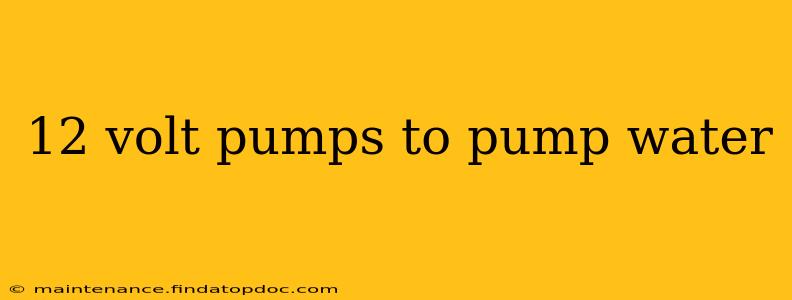12 Volt Pumps to Pump Water: A Comprehensive Guide
Finding the right 12-volt pump for your water needs can feel overwhelming with the sheer variety available. This guide will help you navigate the options, understand the different types, and select the perfect pump for your specific application. Whether you're looking for a pump for your RV, boat, or a small-scale irrigation system, we'll cover the essential factors to consider.
What are the different types of 12-volt water pumps?
Several types of 12-volt pumps cater to various water pumping needs. The most common are:
-
Diaphragm Pumps: These pumps are known for their self-priming capabilities, meaning they can draw water from a source that isn't submerged. They're relatively inexpensive and suitable for low-pressure applications like supplying water to a sink or shower in an RV. However, they are less efficient at higher pressures and volumes.
-
Centrifugal Pumps: These pumps use centrifugal force to move water. They are generally more efficient than diaphragm pumps at higher flow rates and pressures but typically require a submerged or pre-filled intake. Centrifugal pumps are ideal for applications requiring significant water volume, such as boat bilge pumps or larger irrigation systems.
-
Submersible Pumps: These pumps are designed to be submerged directly in the water source. They're excellent for deep wells or water tanks and offer consistent performance. Submersible pumps are typically more robust and durable but can be more expensive than other types.
-
Booster Pumps: These pumps increase the pressure of an existing water supply. They are frequently used in conjunction with other water sources to increase water pressure for appliances or fixtures demanding higher pressure.
How much water pressure and flow rate do I need?
Determining the appropriate pressure and flow rate is crucial for selecting the right 12-volt pump. Consider these factors:
-
Application: A shower will require a higher flow rate than a sink. Irrigation systems require consistent, moderate pressure and flow.
-
Distance: The distance the water needs to travel will impact the required pressure. Longer distances require higher pressure to overcome friction.
-
Head Height: The vertical distance the water needs to be pumped (head height) significantly influences pressure requirements. Greater height demands higher pressure.
What is the difference between GPM and PSI?
-
GPM (Gallons Per Minute): This measures the volume of water pumped per minute. A higher GPM indicates a greater flow rate.
-
PSI (Pounds per Square Inch): This measures the water pressure. Higher PSI indicates stronger water pressure.
You'll need to consider both GPM and PSI when choosing a pump to ensure it meets your application's demands. A low GPM pump with high PSI might not be suitable for a task requiring high volume.
How do I choose the right 12-volt pump for my RV, boat, or other applications?
Selecting the right pump depends on your specific needs. Carefully assess the following:
-
Water source: Is it a tank, well, or surface water? This dictates the type of pump (e.g., submersible, diaphragm).
-
Required flow rate and pressure: How much water do you need, and how much pressure is necessary?
-
Duty cycle: How long will the pump operate continuously? Some pumps are better suited for continuous operation than others.
-
Power consumption: Consider the pump's amperage draw to ensure it doesn't overload your system.
What are some common uses for 12-volt water pumps?
12-volt pumps find use in a wide array of applications, including:
-
RV and camper water systems: Providing water for sinks, showers, and toilets.
-
Boat bilge pumps: Removing water from the bilge to prevent flooding.
-
Irrigation systems: Watering gardens, lawns, and other plants.
-
Livestock watering systems: Providing fresh water to animals in remote locations.
-
Emergency water supplies: Pumping water from alternate sources in case of outages.
By carefully considering these factors, you can select a 12-volt pump that perfectly suits your needs and provides reliable, efficient water pumping for years to come. Remember to always consult the manufacturer's specifications to ensure compatibility with your system and to understand the pump’s capabilities and limitations.
